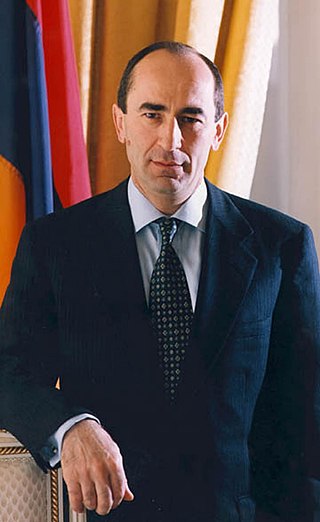
Robert Sedraki Kocharyan is an Armenian politician. He served as the President of the Nagorno-Karabakh Republic from 1994 to 1997 and Prime Minister of Nagorno-Karabakh from 1992 to 1994. He served as the second President of Armenia between 1998 and 2008 and as Prime Minister of Armenia from 1997 to 1998.

Artsakh, officially the Republic of Artsakh or the Nagorno-Karabakh Republic, is a breakaway state in the South Caucasus whose territory is internationally recognised as part of Azerbaijan. Artsakh controls a part of the former Nagorno-Karabakh Autonomous Oblast, including the capital of Stepanakert. It is an enclave within Azerbaijan. Its only overland access route to Armenia is via the 5 km (3.1 mi) wide Lachin corridor which is under the control of Russian peacekeepers.
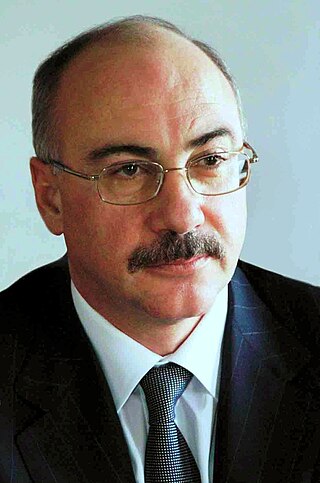
Arkadi Arshaviri Ghukasyan was the second President of the self-proclaimed Nagorno-Karabakh Republic. He was elected as the President on 8 September 1997 and re-elected in 2002, until his term ended on 7 September 2007 and was succeeded by Bako Sahakyan.

Serzh Azati Sargsyan is an Armenian politician who served as the third President of Armenia from 2008 to 2018, and twice as the Prime Minister of Armenia from 2007 to 2008 and again from 17 to 23 April 2018, when he was forced to resign in the 2018 Armenian revolution.

The Republic of Artsakh is a republic with limited recognition in the South Caucasus region. The Republic of Artsakh controls most of the territory of the former Nagorno-Karabakh Autonomous Oblast. It is recognized only by three other non-UN member states, Abkhazia, South Ossetia and Transnistria. The rest of the international community recognizes Artsakh as part of Azerbaijan. In November 2012, a member of Uruguay's foreign relations committee stated that his country could recognize Nagorno-Karabakh's independence. In 2012, Armenia and Tuvalu established diplomatic relations and it was expected that Tuvalu may recognize Artsakh's independence. In October 2012, the Australian state of New South Wales recognized Nagorno-Karabakh. In September 2014, the Basque Parliament in Spain adopted a motion supporting Artsakh's right to self-determination and in November 2014, the Parliament of Navarre, also in Spain, issued a statement supporting Artsakh's inclusion in taking part in settlement negotiations.

Bako Sahaki Sahakyan is an Artsakhi politician who served as the third president of the de facto-independent Republic of Artsakh from 2007 to 2020. He is the longest-serving president of Artsakh.

Arayik Vladimiri Harutyunyan is an Armenian politician who has been serving as the President of Artsakh since 2020. He was formerly the 1st State Minister from 2017 until his resignation in 2018 and 6th and last Prime Minister of the Republic of Artsakh from 2007 until its abolishment upon the adoption of a new constitution in 2017.
This page list topics related to the Republic of Artsakh and Nagorno-Karabakh region.
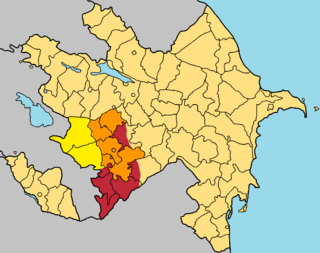
The Madrid Principles, last updated in 2009, are proposed peace settlements of the Nagorno-Karabakh conflict, proposed by the OSCE Minsk Group. As of 2020 the OSCE Minsk Group is the only internationally agreed body to mediate the negotiations for the peaceful resolution of the conflict. Senior Armenian and Azerbaijani officials have agreed on some of the proposed principles but have made little or no progress towards the withdrawal of Armenian forces from occupied territories or towards the modalities of the decision on the future Nagorno-Karabakh status.
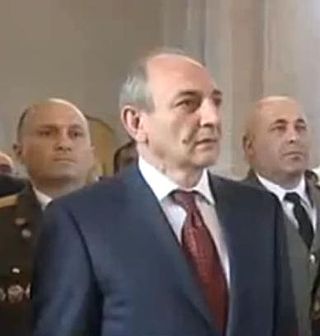
Presidential elections were held in Nagorno-Karabakh on 19 July 2012. Incumbent President Bako Sahakyan was re-elected for a second five-year term, receiving around two-thirds of the vote.

The political status of Nagorno-Karabakh has remained unresolved since Azerbaijan's recognition as an independent state in 1991. During the Soviet Union, it had been an ethnic Armenian autonomous oblast of the Azerbaijan Soviet Socialist Republic; however, the disintegration of the USSR was accompanied by the conflict between local Armenians who sought to join Nagorno-Karabakh to Armenia, and local Azerbaijanis who opposed this. The conflict soon boiled over into open warfare in the First Nagorno-Karabakh War and ethnic cleansing, as a result of which Nagorno-Karabakh - as well as 7 surrounding regions of Azerbaijan - came to be occupied by an Armenia-allied de facto state, the Republic of Artsakh. Negotiations took place sporadically over the following decades, during which a ceasefire generally prevailed between Armenia / Artsakh and Azerbaijan. Turkey and Azerbaijan closed their borders to Armenia and Artsakh, and took other diplomatic steps to isolate them. Meanwhile, the United Nations Security Council, OSCE Minsk Group, and other bodies made various statements and proposed dialogue initiatives; none of them successful. In the 2020 Nagorno-Karabakh war, Azerbaijani forces, backed by Turkey, entered the Artsakh-held territories and retook the southern half of the region, including Shusha. Armenia was forced to concede additional territories in order to preserve Stepanakert and the northern half of the Republic of Artsakh under local Armenian control. The political status of this reduced region was not specified in the agreement, and remains unresolved.

Vitaly Mikhaili Balasanyan is an Artsakhi politician and retired general. He served as the head of the National Security Council of the self-proclaimed Republic of Artsakh from November 2016 to November 2019 and again from December 2020 to January 2023. For his services in the First Nagorno-Karabakh War, he was awarded the country's highest title, Hero of Artsakh. He previously served as a member of Artsakh's National Assembly. He twice ran, unsuccessfully, for the office of President of Artsakh.
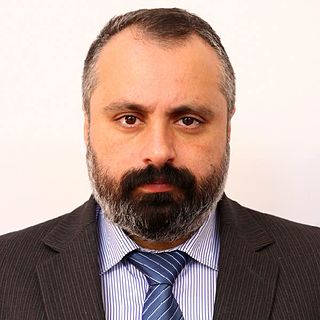
David Klimi Babayan is the Foreign Minister of the Republic of Artsakh. From 28 December 2013 he served as Head of the Central Information Department of the Artsakh Republic. He also served as the Deputy Chief of Staff in the office of the President of the Republic. On 26 May 2020, he was appointed as an adviser to the President on foreign relations. On 4 January 2021, Babayan was appointed the Minister of Foreign Relations taking over from Masis Mayilyan. He founded and currently leads the "Artsakh Conservative Party".

A constitutional referendum was held in the unrecognised Republic of Nagorno-Karabakh on 20 February 2017. At least 25% of registered voters needed to vote in favour in order to validate the result. The referendum passed with about three quarters of voters voting.

General elections were held in the Republic of Artsakh on 31 March 2020, with a second round of the presidential election on 14 April. Voters elected the President and 33 members of the National Assembly. It was the first time the President and National Assembly were elected at the same time.

Indirect presidential elections were held in the unrecognised Republic of Artsakh on 19 July 2017. The incumbent, Bako Sahakyan, was elected to a third term.
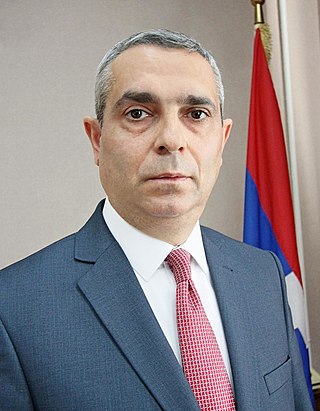
Masis Samveli Mayilyan is an Artsakhi politician, diplomat and former presidential candidate. He is currently serving as ambassador-at-large of the Republic of Artsakh. From September 2017 until January 2021, he served as the Foreign Minister of Artsakh.
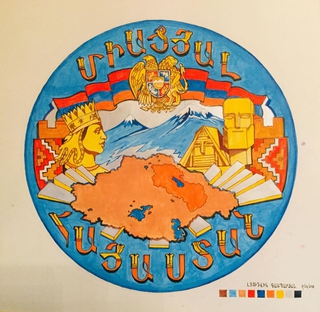
The United Armenia Party is an Armenian political party in Artsakh.
The Republic of Artsakh and the United States do not have official diplomatic relations as the United States is among the vast majority of countries that does not recognize Artsakh as a sovereign nation and instead recognizes the region of Artsakh, or Nagorno-Karabakh, as part of Azerbaijan. Despite no formal relations, the Republic of Artsakh has a representative office in Washington, D.C. since November 1997.

The 2022 Armenian protests were a series of anti government protests in Armenia that started on 5 April 2022. The protests continued into June 2022, and many protesters were detained by police in Yerevan. Protestors demanded Prime Minister of Armenia Nikol Pashinyan resign over his handling of the 2020 Nagorno-Karabakh war. On 14 June 2022, the opposition announced their decision to terminate daily demonstrations aimed at toppling Prime Minister Nikol Pashinyan after failing to achieve popular support.















